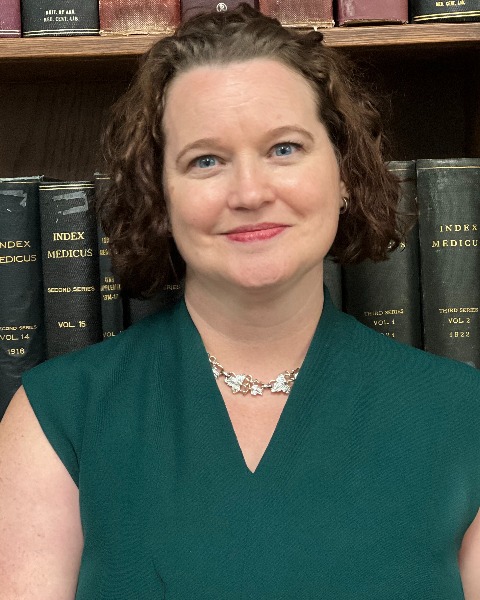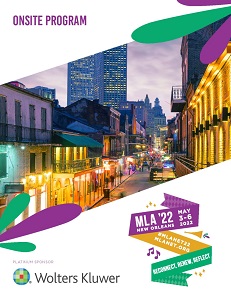Back
Paper: Research Abstract
Education
Session: Papers Virtual Session 6
Health Sciences Faculty Knowledge and Use of Online Textbooks: A Pilot Survey of Two Universities
Friday, April 29, 2022
3:00 PM – 3:15 PM CT

Lindsay E. Blake, AHIP
Clinical Services Coordinator
UAMS Library
Little Rock, Arkansas
Kim Mears
Health Sciences & Scholarly Communications Librarian
Robertson Library
Charlottetown, Prince Edward Island, Canada
Presenter and Author(s)
Author(s)
Objective:
Students across the globe assert that one financial barrier to higher education is the cost of course materials, specifically textbooks. A review of recent literature reveals that the use and adoption of affordable textbooks is gaining ground among undergraduate programs, but is still low in professional health sciences programs. This research examines faculty knowledge of the cost of required course materials and the use of online textbooks (Library provided eBooks and open textbooks) as required course materials.
Methods:
Two librarians working with health sciences programs, one in Canada and one in the United States, utilized a brief survey to explore faculty knowledge and use of electronic textbooks (eBooks) and open textbooks in their courses. Faculty were also queried on their reasons for, or barriers to, selecting electronic or open textbooks as course materials. The survey was distributed to the faculty in medicine, nursing, pharmacy, public health, health professions, health sciences, and veterinary medicine in the Fall 2021 semester. Survey results will be reviewed for faculty knowledge of textbook cost to students; electronic books and availability in their campus libraries; open textbooks and willingness to use or author an open textbook.
Results:
The survey received 92 responses. The largest number of respondents were affiliated with allied health/health professions (n = 20) and veterinary medicine (n=14). Most respondents (63%) did not select a library owned eBook or an open textbook for their courses taught in Fall 2021. Reasons for not using eBooks or open textbooks centered around lack of knowledge, availability, and access. Respondents indicated that they would use a Library consultation service to select a Library owned eBook (n = 24) or an open textbook (n = 33) if it was offered.
Conclusion:
Faculty acknowledge that digital course materials provide many benefits, such as cost savings, convenience, and access to a variety of formats. Libraries often provide access to course eBooks, but faculty knowledge and comfort with this format, as well as beliefs in student preferences, may prevent them from choosing online options. Knowledge and trust of open textbooks is also a current barrier to their adoption. Interest in selecting and using online textbooks exists among faculty, but library services are needed to increase their use.
Students across the globe assert that one financial barrier to higher education is the cost of course materials, specifically textbooks. A review of recent literature reveals that the use and adoption of affordable textbooks is gaining ground among undergraduate programs, but is still low in professional health sciences programs. This research examines faculty knowledge of the cost of required course materials and the use of online textbooks (Library provided eBooks and open textbooks) as required course materials.
Methods:
Two librarians working with health sciences programs, one in Canada and one in the United States, utilized a brief survey to explore faculty knowledge and use of electronic textbooks (eBooks) and open textbooks in their courses. Faculty were also queried on their reasons for, or barriers to, selecting electronic or open textbooks as course materials. The survey was distributed to the faculty in medicine, nursing, pharmacy, public health, health professions, health sciences, and veterinary medicine in the Fall 2021 semester. Survey results will be reviewed for faculty knowledge of textbook cost to students; electronic books and availability in their campus libraries; open textbooks and willingness to use or author an open textbook.
Results:
The survey received 92 responses. The largest number of respondents were affiliated with allied health/health professions (n = 20) and veterinary medicine (n=14). Most respondents (63%) did not select a library owned eBook or an open textbook for their courses taught in Fall 2021. Reasons for not using eBooks or open textbooks centered around lack of knowledge, availability, and access. Respondents indicated that they would use a Library consultation service to select a Library owned eBook (n = 24) or an open textbook (n = 33) if it was offered.
Conclusion:
Faculty acknowledge that digital course materials provide many benefits, such as cost savings, convenience, and access to a variety of formats. Libraries often provide access to course eBooks, but faculty knowledge and comfort with this format, as well as beliefs in student preferences, may prevent them from choosing online options. Knowledge and trust of open textbooks is also a current barrier to their adoption. Interest in selecting and using online textbooks exists among faculty, but library services are needed to increase their use.

.png)
